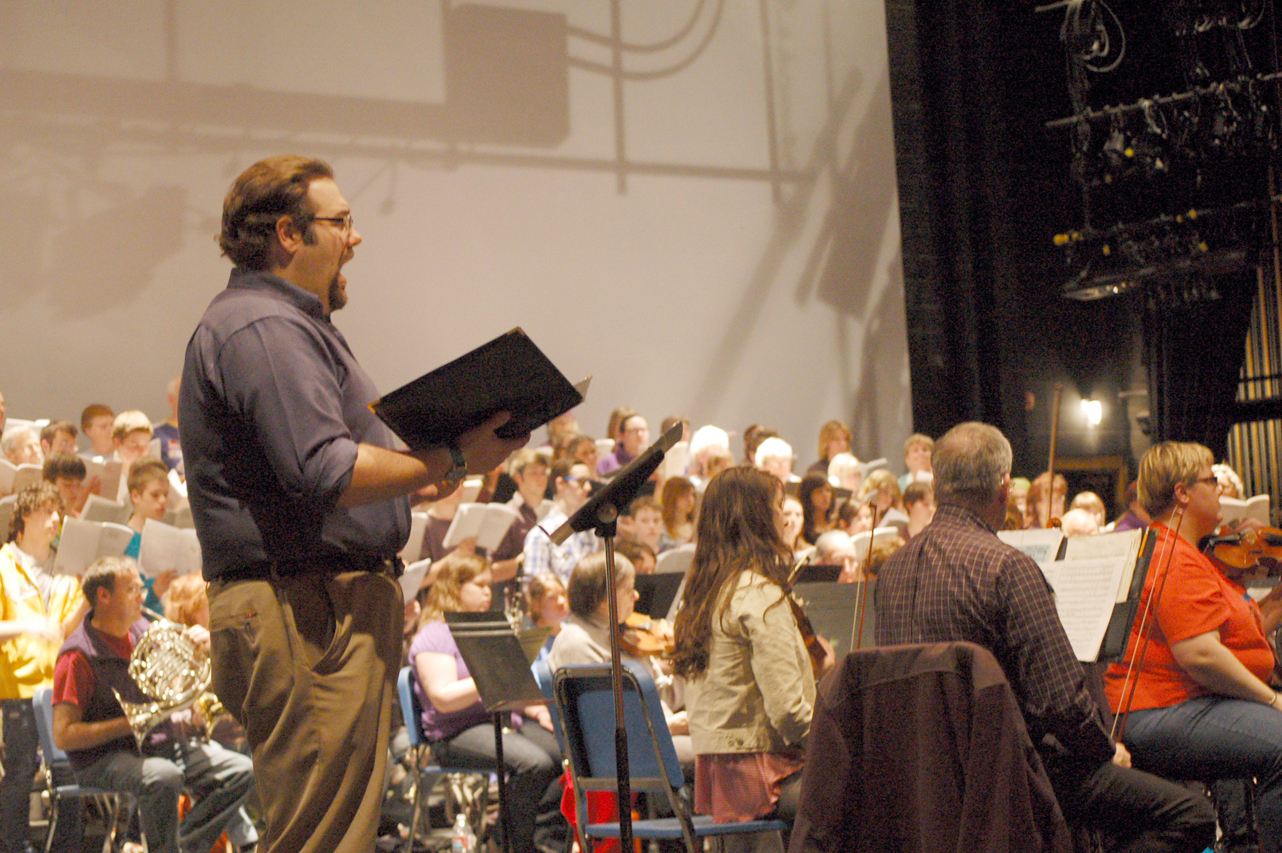In the grand arc of Mark Robinson’s teaching and musical career, Johannes Brahms’ “Requiem” serves as a personal touchstone from singing it at age 15 in high school choir to conducting it in a new performance this week.
“It’s a long history for me personally,” Robinson said of the choral work.
Robinson, who retired in 2012 after teaching 23 years at Homer High School, conducts the Kenai Peninsula Community Chorus, Homer High School Concert Choir and Kenai Peninsula Orchestra in a performance of Brahms’ “Requiem” at 7:30 p.m. Friday, Renee C. Henderson Auditorium, Kenai Central High School and 7:30 p.m. Saturday, and 3 p.m. Sunday at the Mariner Theatre.
As a teenager singing in the Broad Ripple High School choir in Indianapolis, Ind., under his mentor and teacher, Gene Poston, Brahms’ “Requiem” profoundly changed his feelings about music, Robinson said.
“I had never been exposed to something this powerful,” he said. “I didn’t realize something existed like this at this level.”
This weekend’s performance is dedicated to Poston, Robinson said. “Requiem” went on to continue to affect his life in these ways:
• In 1994, after Robinson’s mother died in 1993, he first organized a performance of “Requiem” with the high school choir, community chorus and peninsula orchestra;
• In 2007, alumni and alumnae of the choir program at Broad Ripple High School from 1956-1980 gathered for a reunion to honor Poston, with Robinson conducting the Fourth Movement of the “Requiem,” “How Lovely is Thy Dwelling Place”; and
• Last summer, after Poston died, Robinson conducted the alumni choir at his funeral, again in the Fourth Movement of the “Requiem.”
“It’s been a real powerful thread,” Robinson said. “The music is so powerful and so beautiful and so magnificent.”
Called “A German Requiem” in its original composition, Brahms started “Requiem” in 1865, finishing it in late 1866, with its first performance on Good Friday, April 10, 1868, in the Bremen Cathedral, Germany. Written in German and not Latin, the language then of the Roman Catholic church, it’s theologically different from traditional Catholic requiem masses.
“It’s all Biblical, but it is not dogmatically Christian,” Robinson said. “Its focus is on the comforting of the living and not so much praying for the soul of the deceased.”
Brahms himself called it “a human requiem.”
“It’s all about this idea of recognizing the frailty of human life,” Robinson said. “Turning it into joy and recognition that death is a changed state and we will not suffer — no more pain, no more grief. It’s meant to be very comforting to the living.”
That theme is even reflected in the composition of each movement, starting in a minor key and ending in a major key, Robinson said.
“Every movement has this transition feeling from sorrow to joy, from sadness to acceptance and peace,” he said. “There are heavy moments to it, but it’s more joyous than sad. And it’s Brahms. He’s a towering genius. I could do this the rest of my life and I still couldn’t understand it.”
Poston, his choir teacher, “taught me everything I needed to know about teaching,” Robinson said.
“He was a tremendous man, a gifted musician and really gifted educator.”
That continued even after Robinson retired. When Poston was sick last summer, Robinson visited him.
“He’s schooling me on how to conduct Brahms from his hospital bed,” he said. “That’s who he was.”
At Sunday’s rehearsal, Robinson showed how Poston had taught him. During one movement, Robinson stepped down from the podium and walked to the back of the theater, the better to listen to the orchestra and chorus. The Mariner Theatre’s acoustics work well for the audience but not so much for the performers, and Robinson wanted to do a sound check. That’s something Poston would do, too. He’d walk off the stage during a song, then come back onstage right before it ended, finish it, and take a bow.
“Maybe I learned that from my mentor, too,” Robinson said.
There’s one more bit of coincidence and poignancy to this performance of Brahms’ “Requiem,” and to requiem compositions in general. In the summer of 2001 before the events of Sept. 11, Robinson conducted Mozart’s “Requiem.” On Sept. 12, 2002, on the anniversary of the attacks, Robinson conducted another performance of Mozart’s “Requiem” as part of an international series of performances, the “Rolling Requiem,” where the work was performed in every time zone.
“And now the Boston bombing happened,” Robinson said.
Michael Armstrong can be reached at michael.armstrong@homernews.com.


